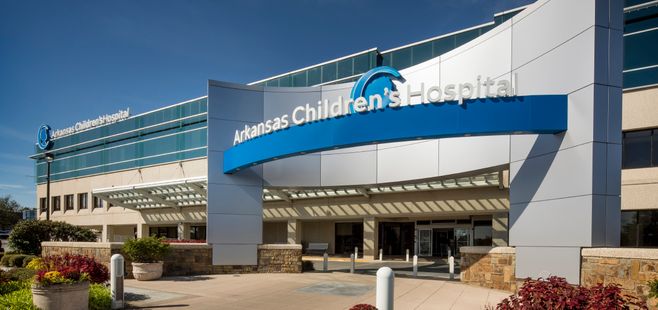Arkansas Children’s raising minimum wage for workers to $14 per hour
by October 28, 2018 10:28 am 4,210 views

Arkansas Children's campus in Little Rock.
Arkansas Children’s CEO Marcy Doderer said one of the state’s largest health care systems will raise its minimum wage for entry level jobs to $14 per hour in the next fiscal year.
Doderer, appearing on this week’s edition of Talk Business & Politics, discussed this topic, the debate over pre-existing conditions, and a new legal initiative underway with Walmart and Legal Aid of Arkansas.
“In some circles, it’s probably considered controversial,” she said of the minimum wage increase. “I think it is a testament to the Board of Directors of the Arkansas Children’s System and the importance they place on having a strong, vibrant workforce.”
Noting that Arkansas Children’s employs roughly 4,300 workers, Doderer said the children’s healthcare system wants its employees to have a living wage.
“When we think about our obligation to the people who work for us who are part of our team, one of those things we want to provide them is a living wage. When I came to Arkansas Children’s five years ago, our minimum wage at Arkansas Children’s was just over $8.00 an hour, it’s currently at $10.10, so for any entry level worker, the minimum pay is $10.10 an hour. On January 1, we’re moving to $14.00 an hour,” she said.
“It’s part of our budget, it was endorsed by the board. We believe it helps create a living wage. Not dissimilar to retailers, what they’ve done across the country moving to $15.00, we’re not taking that step. It’s our ultimate long-term goal. We will move to minimum wage of $14.00 an hour so that our employees feel like their paycheck can take care of them and their families,” Doderer added.
The Arkansas Children’s CEO also weighed in on the debate over pre-existing conditions. She said that how insurance companies gauge pre-existing conditions and lifetime caps on medical coverage can be of “utmost importance” for children, who struggled for insurance coverage based on medical problems they may have had from birth prior to the Affordable Care Act.
“A children’s hospital sees, in any given state, we only touch about 15% of all children. Most children don’t ever need us, but the kids who need us are the ones that will be impacted by such a rule change or policy change,” she said. “If you’re born with a congenital anomaly, if you suffer from childhood cancer, if you have a severe automobile accident and have recurring and complex and chronic illness because of that, those all start to form a pre-existing condition. And become very worrisome to families as a parent moves jobs and gets a new health insurance product, as the child ages and goes through college and is on their own, they enter their own workforce and they have to enroll in their own health plan, what that will be. So it is a very real issue for millions of Americans. And it’s something that the Affordable Care Act helped protect us against, any future damage to that individual and we would love to maintain that.”
Arkansas Children’s has also embarked on a recent initiative partnering with Walmart and Legal Aid of Arkansas to address issues that require legal counsel to help with child well-being. Doderer said there are many issues related to child health that have little to do with the clinical setting where a doctor may see a young patient.
“Social determinants” of health can dictate overall health, she said. This includes your living environment, food, exercise, and social networks, for example.
“We believe zip code actually determines health considerably more than genetic code and for kids. So when families arrive at our hospital for care, we first and foremost take care of them from a clinical standpoint, but we’ve gotten really good at trying to understand what else is going on in the life of that family or that child that is going to impact the overall health of the child,” Doderer said.
“For families who are at a lower socioeconomic level or just don’t have an education or an understanding of a legal system, they may need help working with a landlord to ensure that the home or apartment is actually clean and safe for an asthmatic child or they need help fighting an insurance issue when the insurance company isn’t wishing to pay for something but it’s a covered benefit. We want to connect that family with a legal source that can help them,” she said.
Walmart’s corporate attorneys as well as Legal Aid of Arkansas have entered into a pro bono partnership with Arkansas Children’s to help those families with legal issues. Doderer said it’s a business partnership she’s seen in other states and that it’s helped close to 1,000 families in the last year.
You can watch her full interview in the video below.
